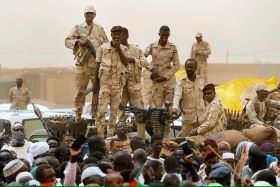

The UN says violence motivated by ethnicity by Sudan’s paramilitary Rapid Support Forces RSF and allied militia have led to the killing of hundreds of people since the war broke out in the country. The RSF has been accused of perpetrating war crimes. The group has since denied the charges…
A United Nations Human Rights chief has announced that ethnically driven attacks by Sudan’s paramilitary Rapid Support Forces (RSF) and allied militia have killed hundreds in West Darfur.
Since April, when conflict between the Sudanese army and the RSF erupted, bloodshed, violence, and displacement have increased, pushing the country to the verge of civil war.
Volker Turk, U.N. High Commissioner for Human Rights, told the Human Rights Council in Geneva that “In West Darfur, ethnically motivated attacks perpetrated by the RSF and allied Arab militia have resulted in the deaths of hundreds of non-Arab civilians primarily from Masalit communities.”
He stressed that “Such developments echo a horrific past that must not be repeated,” referring to the conflict in Darfur that killed up to 300,000 people and displaced over 2 million people between 2003 and 2008.
The UN official noted that the most recent strikes took place mainly in El Geneina, the capital of West Darfur.
Tens of thousands of people have fled across the neighbouring border into Chad as a result of reported attacks on the non-Arab Masalit people, the main community in El Geneina.
Turk also referred to a “ongoing epidemic of conflict-related sexual violence,” stating that his office had received reliable reports of 45 incidences involving at least 95 victims, including 75 women, one man, and 19 children.
The Rapid Support Forces has been accused of war crimes, including sexual violence.
RSF however denied allegations raised against its forces by conflict monitors, rights groups, and witnesses that it is responsible for attacks on civilians, and has stated that any of its soldiers proven to be implicated will face prosecution.
more recommended stories
 Somaliland to Defend Sovereignty Against Somalia’s Provocative Laascaanood Visit
Somaliland to Defend Sovereignty Against Somalia’s Provocative Laascaanood VisitThe Ministry of Foreign Affairs and.
 New Director Appointed: Burao Hospital’s Fall and the Fight for Revival
New Director Appointed: Burao Hospital’s Fall and the Fight for RevivalBurao Hospital begins a new chapter.
 Somaliland: While Mogadishu Burns, Somalia Seeks Chaos in Sool
Somaliland: While Mogadishu Burns, Somalia Seeks Chaos in SoolHargeisa, April 9, 2025 – (Somaliland.com).
 Somaliland Presidency Delivers 10 Vital Dialysis Machines to Hargeisa Group Hospital
Somaliland Presidency Delivers 10 Vital Dialysis Machines to Hargeisa Group HospitalHargeisa – Somaliland – The President.

